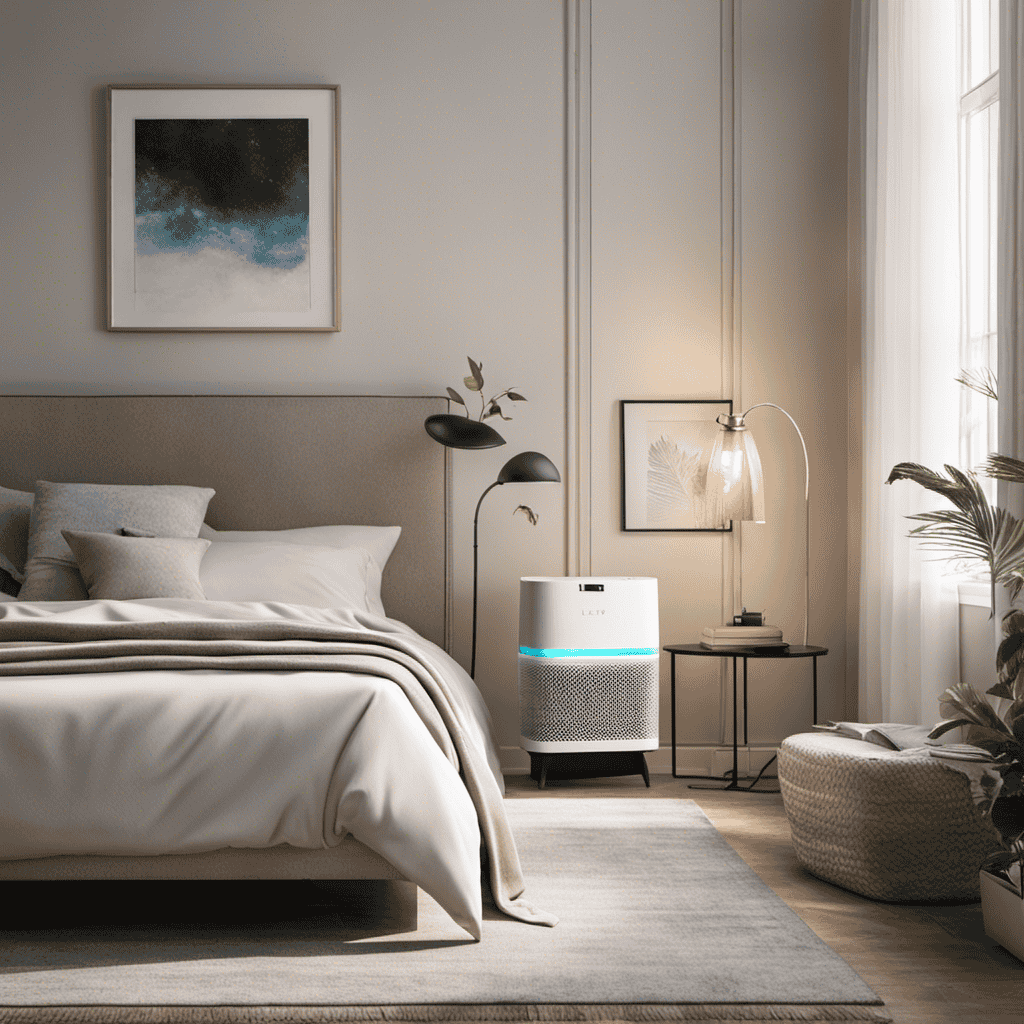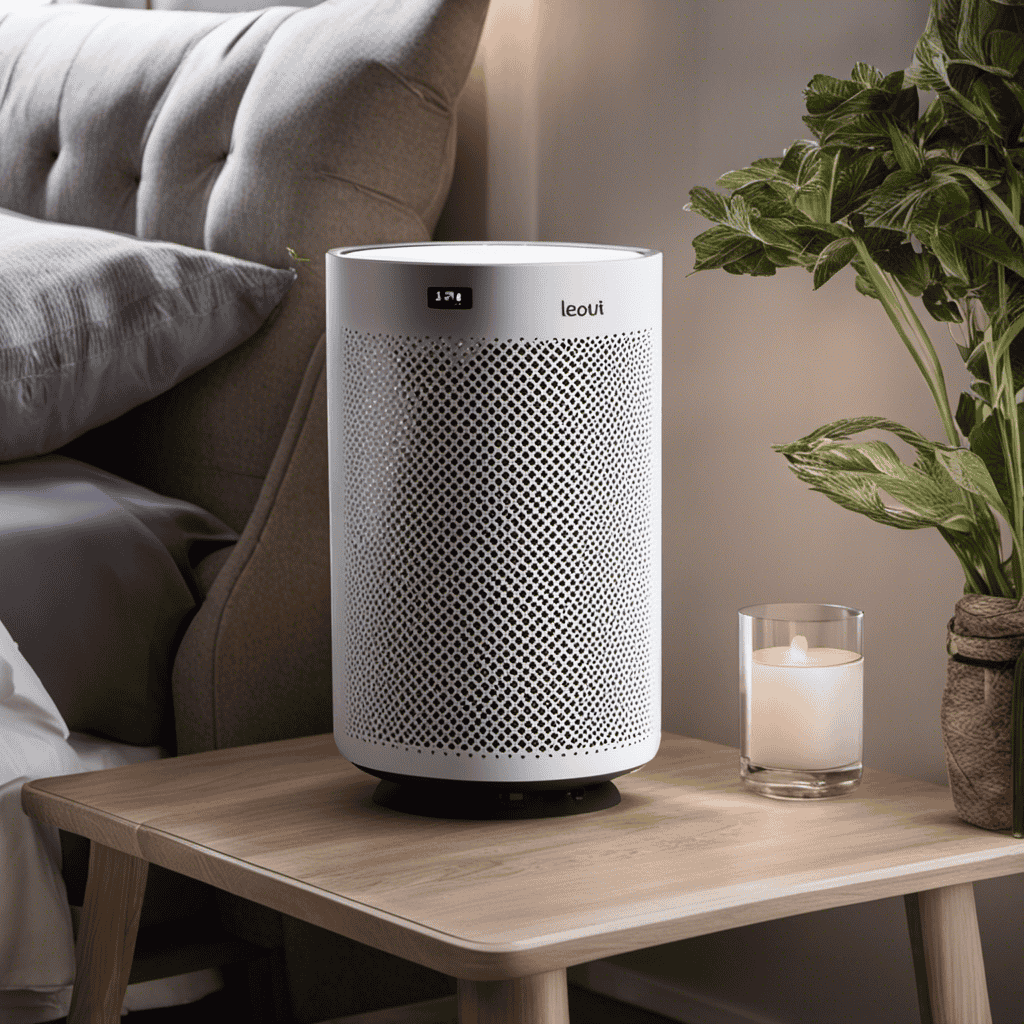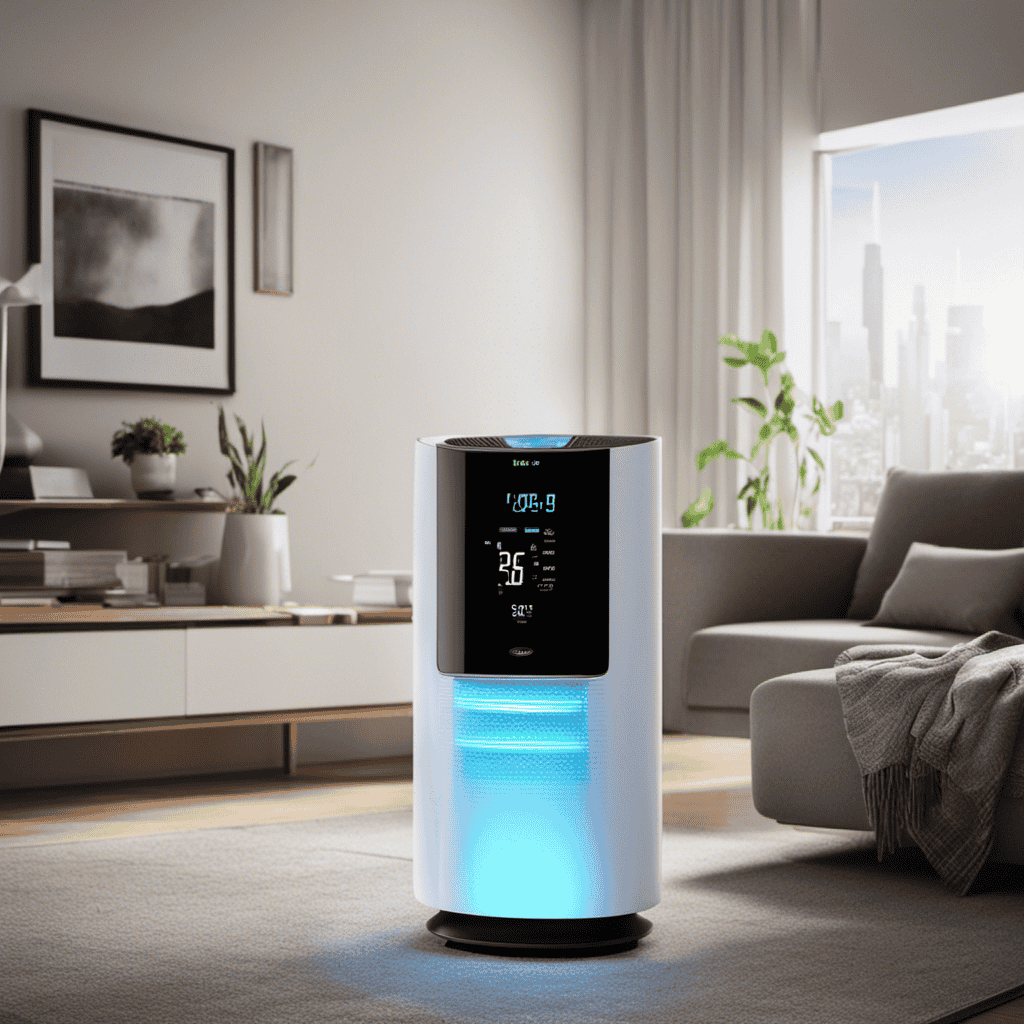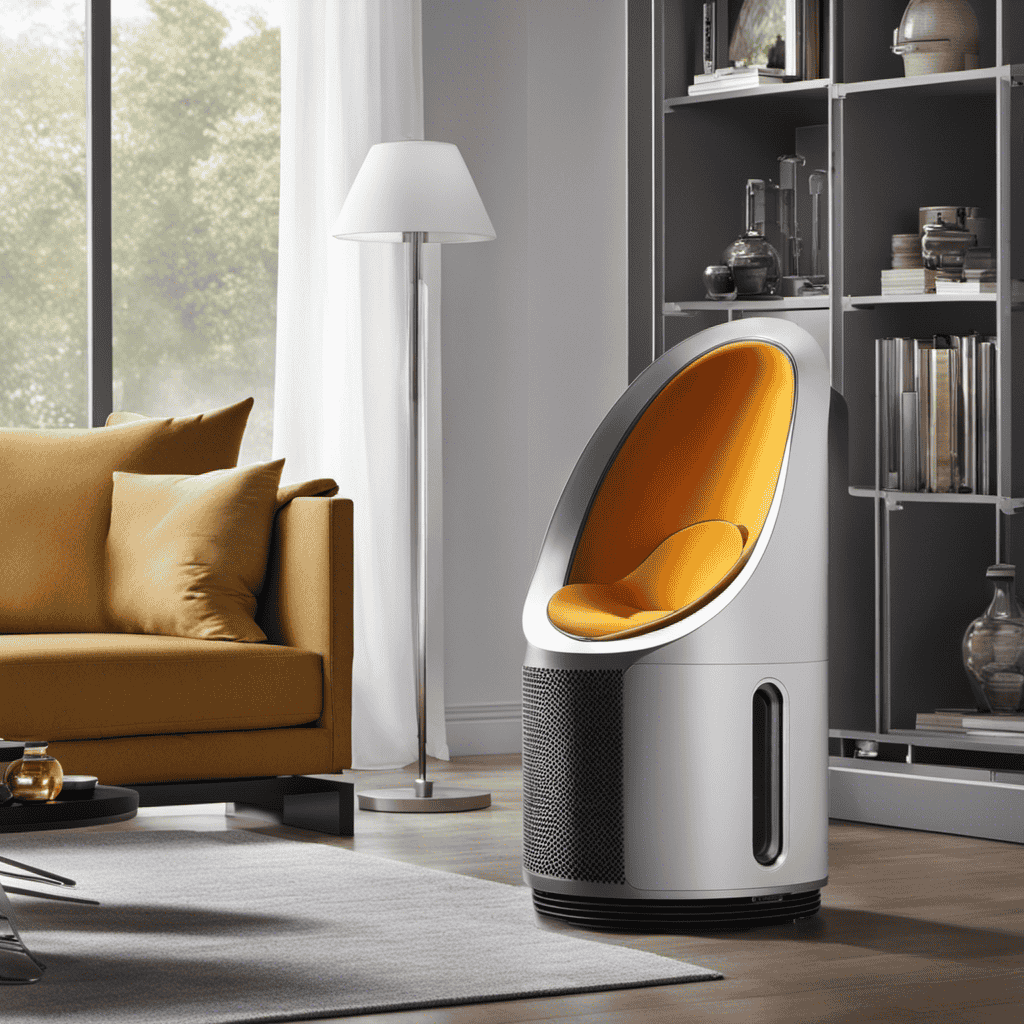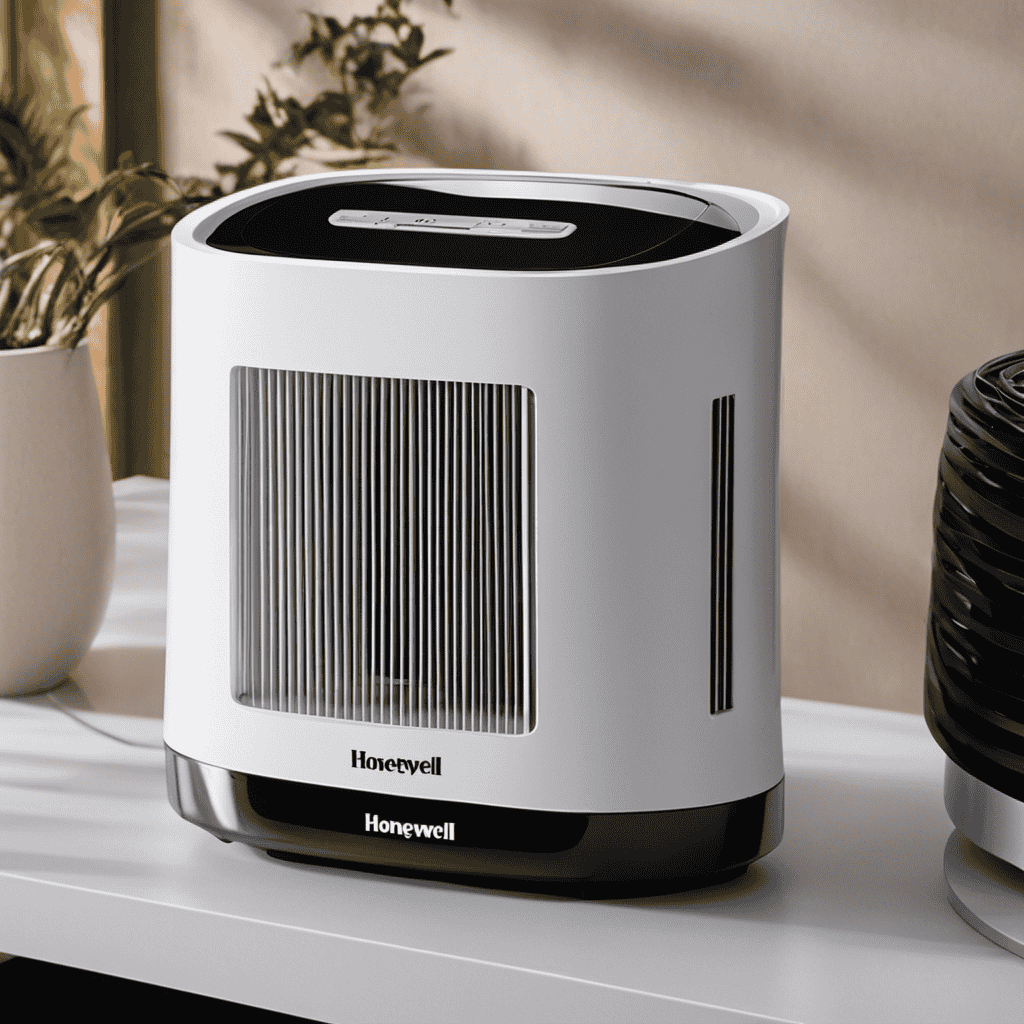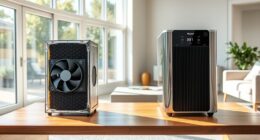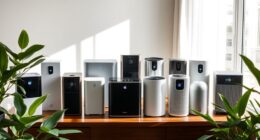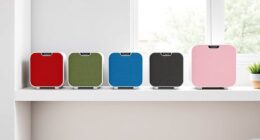As a Levoit Air Purifier owner, I frequently wonder: How long is it safe to keep it running? This article explores the safety precautions, suggested operating times, and key factors to keep in mind when leaving your Levoit Air Purifier on.
Understanding its energy consumption and maximizing its effectiveness are key to maintaining a clean and healthy environment. However, we must also be aware of the potential risks of leaving it on for extended periods.
Let’s uncover the answers together.
Key Takeaways
- Levoit recommends running the air purifier for no more than 12 hours continuously to prevent overheating or reduced efficiency.
- Optimize runtime by using the air purifier for 8-12 hours per day and giving it regular breaks to cool down and prevent damage.
- Utilize energy-saving features like programmable timers and sleep mode to customize runtime and minimize energy usage.
- Consider room size, air quality, and specific model when determining the safe duration for leaving the Levoit air purifier on.
Safety Guidelines for Leaving Your Levoit Air Purifier on
You should know that it’s important to follow safety guidelines when leaving your Levoit air purifier on for extended periods of time.
Levoit recommends running the air purifier for no more than 12 hours continuously to ensure optimal performance and longevity. Continuous operation beyond the recommended run times may cause the device to overheat or lead to reduced efficiency.
It’s essential to give the air purifier regular breaks to cool down and prevent any potential damage.
Additionally, keeping an eye on energy consumption is crucial. Levoit air purifiers are designed to be energy-efficient, but extended usage can still increase electricity costs.
Therefore, it is advisable to turn off the air purifier when not needed or during times when air quality is relatively good.
Recommended Run Times for Your Levoit Air Purifier
When considering the optimal runtime for an air purifier, it is important to take into account energy efficiency considerations.
The recommended run times for a Levoit air purifier are determined by several factors, including the size of the room, the air quality, and the specific needs of the user.
Optimal Air Purifier Runtime
To optimize the runtime of your Levoit air purifier, it’s recommended to use it for a duration of 8-12 hours per day. This will ensure that the air purifier effectively cleans the air in your space without wasting excessive power. Here are four reasons why following the recommended runtimes is important:
-
Energy Efficiency: By using the air purifier for the recommended duration, you can minimize power usage and reduce your energy consumption.
-
Filter Lifespan: Using the air purifier within the recommended runtimes helps prolong the lifespan of the filters. This means you won’t have to replace them as frequently, saving you money in the long run.
-
Air Quality Maintenance: Running the air purifier for the recommended duration ensures that the air in your space remains clean and fresh throughout the day.
-
Noise Reduction: The Levoit air purifier operates quietly, but running it for extended periods may cause some noise. Following the recommended runtimes helps minimize any potential disturbance.
Energy Efficiency Considerations
Running the device for shorter periods can help save energy and reduce power consumption. Levoit air purifiers come equipped with energy-saving features that allow for efficient use of electricity. These features include programmable timers, auto mode, and sleep mode. By utilizing these functions, you can customize the runtime of the air purifier to meet your needs while minimizing energy usage. It is important to consider the environmental impact of prolonged usage of air purifiers. While they help improve indoor air quality, excessive and unnecessary operation can result in increased energy consumption and greenhouse gas emissions. By utilizing the energy-saving features and operating the device for shorter periods, you can enjoy the benefits of clean air while minimizing its environmental impact.
| Feature | Description | Benefit |
|---|---|---|
| Programmable | Set specific runtime schedules | Energy conservation |
| Timer | Automatically turns off the device | Reduced power consumption |
| Auto Mode | Adjusts fan speed based on air quality | Efficient operation |
| Sleep Mode | Runs at a low fan speed and noise level | Quiet operation |
| Energy-saving | Minimizes energy consumption | Environmentally friendly |
Factors to Consider Before Leaving Your Levoit Air Purifier on
Before leaving your Levoit air purifier on, it’s important to consider several factors.
First, the safe duration for running the purifier depends on various factors such as the size of the room and the air quality.
Second, power consumption concerns should be taken into account, as running the purifier for extended periods may result in higher energy usage.
Lastly, it’s crucial to understand the impact on air quality, as continuous operation may lead to over-purification or unnecessary filtration.
Safe Duration for Levoit
Make sure you don’t exceed the recommended duration for running your Levoit air purifier continuously. The safe duration for using a Levoit air purifier depends on several factors, including the model and size of the unit.
Here are four key considerations to keep in mind:
-
Manufacturer’s guidelines: Always refer to the user manual or manufacturer’s recommendations for the specific safe duration of your Levoit air purifier model.
-
Room size: Larger rooms may require longer operation times to effectively clean the air. Consider the square footage of your space when determining the safe duration.
-
Air quality: If you’re dealing with severe pollution or allergens, you may need to run the air purifier for longer periods to maintain clean air.
-
Energy consumption: Running your air purifier continuously can lead to higher energy consumption. Be mindful of your energy usage and consider turning it off when you don’t need it.
By following these guidelines, you can ensure a safe duration for operating your Levoit air purifier while also being mindful of energy consumption.
Now, let’s explore power consumption concerns in more detail.
Power Consumption Concerns
One important factor to consider when using a Levoit air purifier is the amount of energy it consumes. The power usage of an air purifier not only affects your electricity bill but also has an environmental impact. To give you an idea of the power consumption of different Levoit air purifier models, here is a table showcasing their energy usage:
| Model | Power Consumption (Watts) |
|---|---|
| LV-H132 | 28 |
| Core 300 | 45 |
| LV-PUR131S | 55 |
As you can see, the power consumption varies across models. It is recommended to choose an air purifier that meets your needs while also being energy-efficient. By selecting a model with lower power consumption, you can minimize your environmental footprint and reduce energy costs in the long run.
Impact on Air Quality?
After considering the power consumption concerns of leaving the Levoit air purifier on, let’s now explore the impact it can have on air quality. Using an air purifier offers several benefits, especially in areas with high levels of air pollution. Here are four key points to consider:
-
Reduction of pollutants: Air purifiers are designed to filter out harmful particles such as dust, pollen, pet dander, and smoke. By continuously running the purifier, it helps remove these pollutants from the air, improving its quality.
-
Allergen control: For individuals with allergies or asthma, air purifiers can be particularly beneficial. They help to reduce the presence of allergens in the air, providing relief from symptoms and improving overall respiratory health.
-
Odor elimination: Air purifiers equipped with activated carbon filters can effectively eliminate unpleasant odors caused by cooking, pets, or chemicals. This results in a fresher and more pleasant indoor environment.
-
Health protection: Long-term exposure to air pollution can have detrimental effects on our health, including respiratory issues, cardiovascular problems, and even cancer. By using an air purifier, we can minimize our exposure to harmful pollutants and protect our health in the long run.
Understanding the Energy Consumption of Your Levoit Air Purifier
To understand how long you can leave your Levoit air purifier on, it’s important to consider its energy consumption. Levoit air purifiers are designed with energy saving features that help minimize their environmental impact. These features include a low power mode, automatic shut-off timers, and energy-efficient motors. By utilizing these energy saving features, you can maximize the effectiveness of your air purifier while reducing its energy consumption.
Here is a table depicting the energy consumption of different Levoit air purifier models:
| Air Purifier Model | Energy Consumption (Watts) | Recommended Operating Time |
|---|---|---|
| Model A | 30 | 24 hours |
| Model B | 40 | 18 hours |
| Model C | 50 | 12 hours |
Tips for Maximizing the Effectiveness of Your Levoit Air Purifier
By utilizing the energy-saving features of your Levoit air purifier, you can optimize its effectiveness. Here are some maintenance tips to maximize the performance of your purifier:
-
Clean or replace the filters regularly: Dirty filters can reduce the airflow and efficiency of your purifier. Cleaning or replacing them every 6-12 months is recommended.
-
Keep the purifier in an open space: Placing the purifier in a central location with good airflow ensures that it is able to effectively circulate and clean the air in the room.
-
Adjust the fan speed: Depending on the air quality and room size, you can adjust the fan speed to maximize the purifier’s performance. Higher fan speeds are ideal for larger rooms or polluted environments.
-
Use the timer function: If you don’t need the purifier to run continuously, utilizing the timer function can help save energy while still maintaining clean air in your space.
Following these maintenance tips will ensure that your Levoit air purifier performs optimally and effectively improves the air quality in your home or office.
Potential Risks of Leaving Your Levoit Air Purifier on for Extended Periods
Leaving your Levoit air purifier on for extended periods can lead to potential risks.
While air purifiers are designed to improve indoor air quality, excessive use can have negative effects. One potential health effect is dryness in the air, which can cause discomfort and respiratory issues.
Additionally, constantly running the purifier can increase the risk of electrical malfunctions or overheating, posing a fire hazard.
To avoid these risks, it is important to follow the manufacturer’s recommended usage guidelines and practice regular maintenance. This includes cleaning or replacing the filters as needed and ensuring proper airflow around the unit.
Frequently Asked Questions
Can I Leave My Levoit Air Purifier on Overnight?
Yes, you can leave your Levoit air purifier on overnight. It is energy-efficient and has a low noise level, making it suitable for continuous operation.
What Is the Average Energy Consumption of a Levoit Air Purifier When Left on for Extended Periods?
The average energy consumption of a Levoit Air Purifier during extended use can vary depending on the model. It is important to consider the effects of prolonged usage on energy bills and overall efficiency.
Are There Any Health Risks Associated With Leaving My Levoit Air Purifier on for Too Long?
Leaving the Levoit Air Purifier on for extended periods can have potential health benefits by improving indoor air quality. However, it’s important to follow manufacturer instructions and avoid excessive use to prevent any adverse effects.
Can I Leave My Levoit Air Purifier on When I’m Not at Home?
I can leave my Levoit air purifier on when I’m not at home. It consumes energy, but the benefits of using an air purifier outweigh the cost. It helps maintain clean air quality.
How Often Should I Clean or Replace the Filters in My Levoit Air Purifier When It Is Left on for Long Periods?
When keeping my Levoit air purifier on for extended periods, I must consider the frequency of filter cleaning or replacement. Regular maintenance ensures optimal performance and reduces energy consumption.
Can Leaving the Levoit Air Purifier on for Extended Periods of Time Affect the Lifespan of the Filter?
Leaving the Levoit Air Purifier on for extended periods of time can affect the air purifier filter lifespan. Continuous use may cause the filter to fill up faster, leading to a shorter lifespan. It’s recommended to follow the manufacturer’s guidelines for optimal filter lifespan.
Conclusion
In conclusion, keeping your Levoit Air Purifier on for extended periods can be like having a loyal guardian watching over your indoor air quality. Just like a superhero, it tirelessly removes pollutants and allergens, ensuring a clean and fresh environment.
However, it’s important to follow safety guidelines and consider factors like energy consumption. By understanding these aspects and implementing tips to maximize effectiveness, you can enjoy the benefits of your Levoit Air Purifier while minimizing any potential risks.
So go ahead, let your air purifier be the unsung hero of your home!
